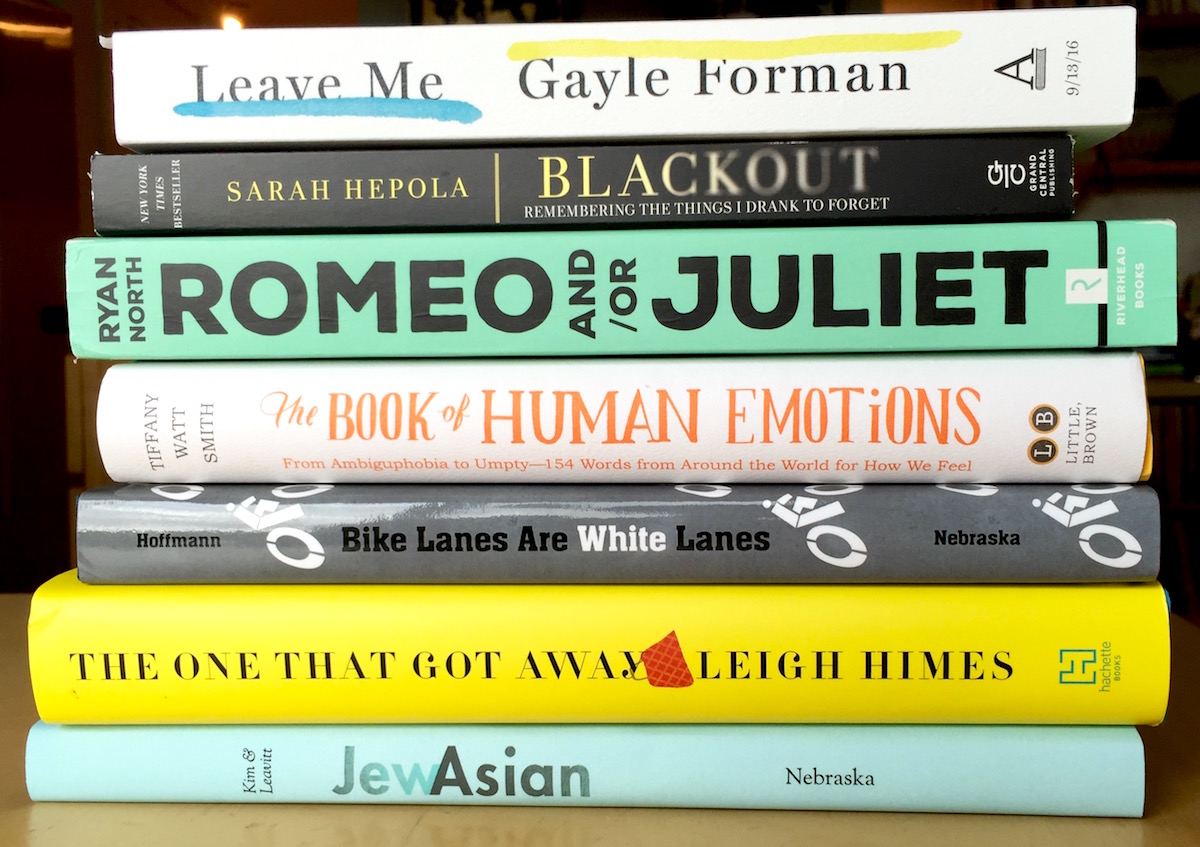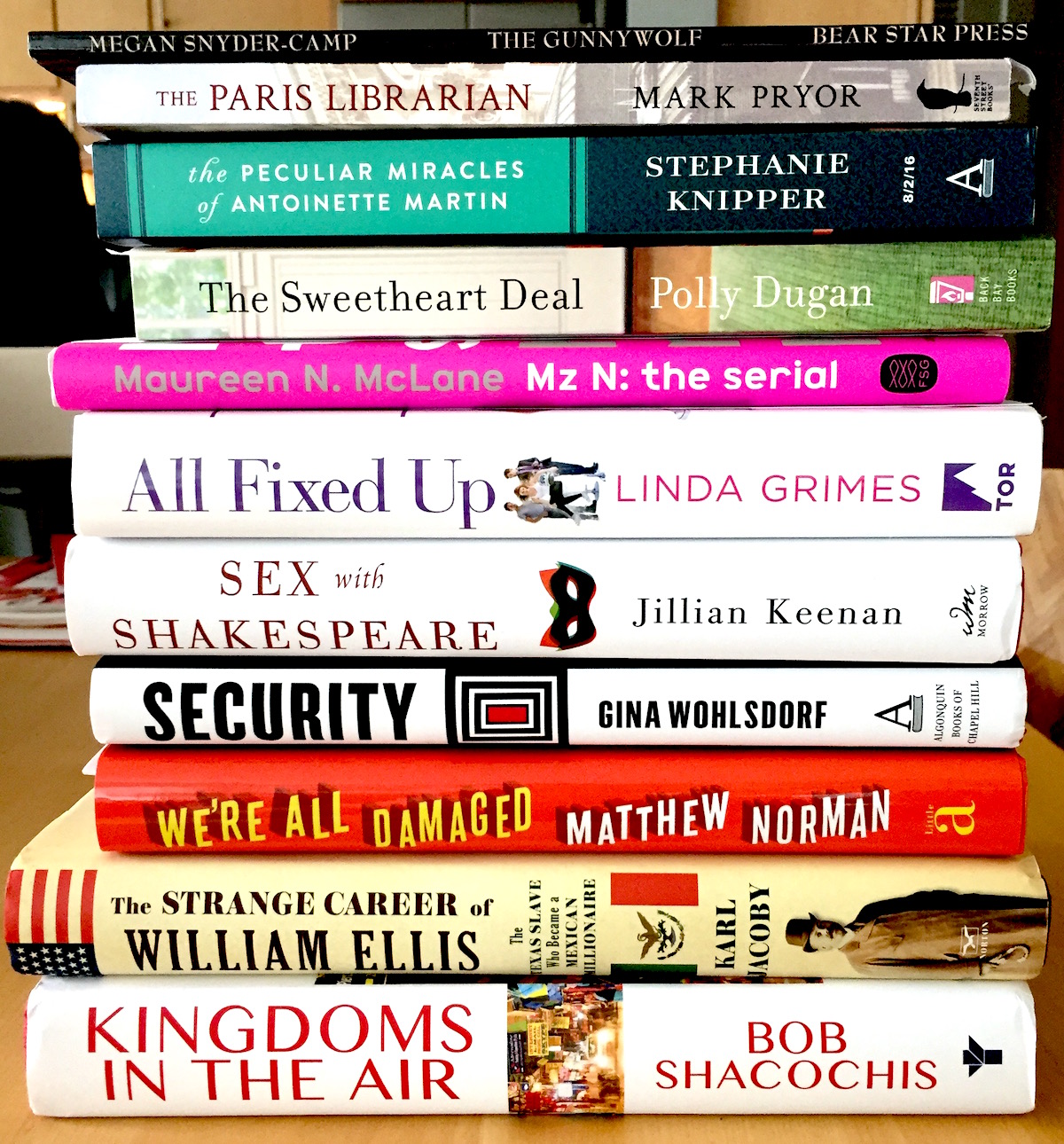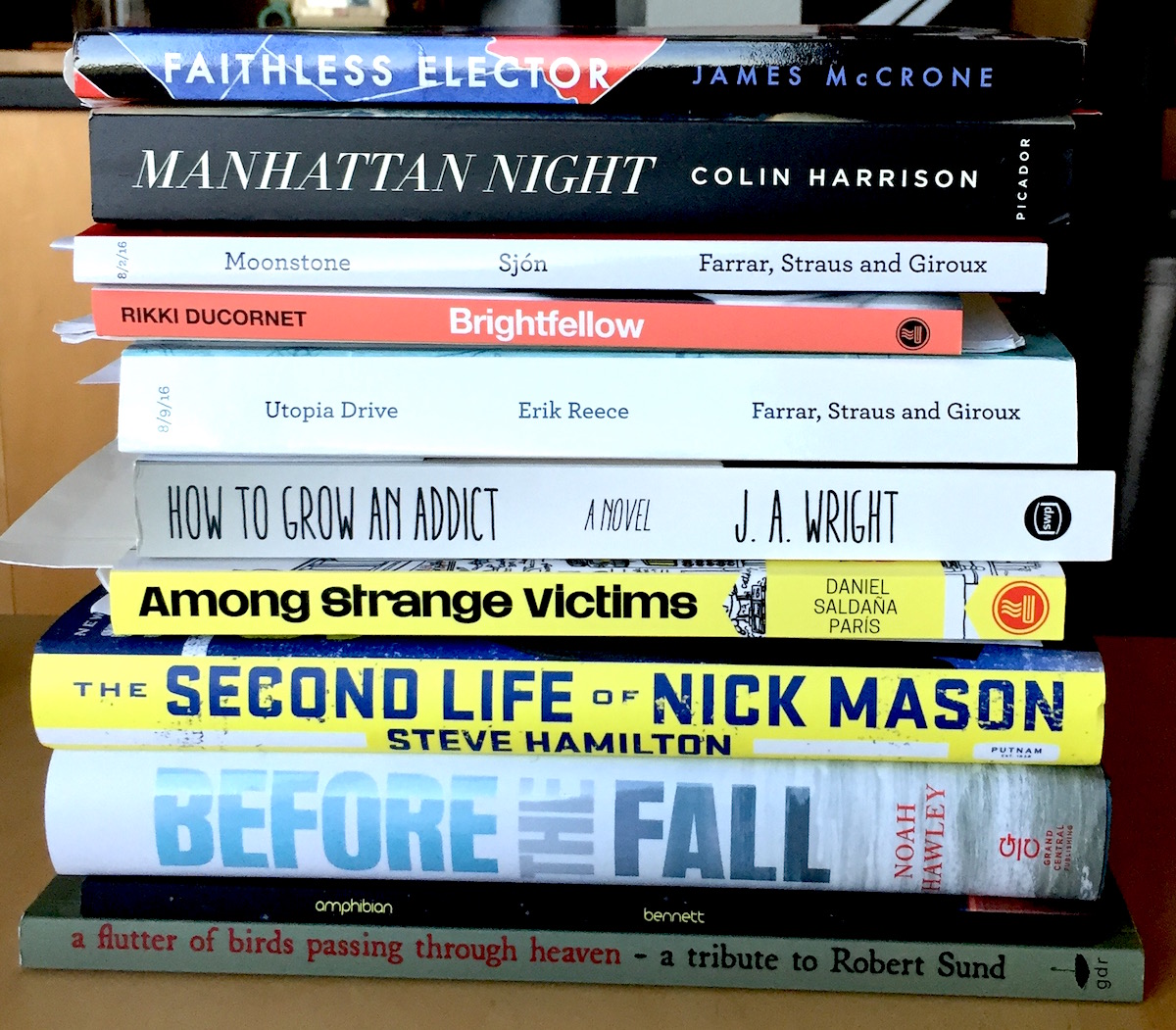Talking with Lindy West about fantasy novels, deadlines, and why Seattle is her home
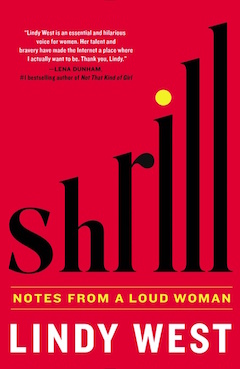
Lindy West’s debut memoir, Shrill was published yesterday to great acclaim. I had to recuse myself from reviewing it for the Seattle Review of Books due to personal circumstances; I was Lindy’s coworker at The Stranger for three years, and she asked me to read Shrill before its publication. And so I know I’m biased, but I do love this book: I think Shrill is funny and honest and heartbreaking and empowering and meaningful. It starts in the way you always expect Lindy’s writing to go, with some jokes and sharp observations, but by the end it’s become something different. Lindy’s writing gets more nuanced and vulnerable and powerful as the book goes along, creating so much more than just a collection of personal essays: it’s a story of evolution and a personal account of growing up, both as an adult and on the internet as a personality. Lindy and I met up for lunch on Tuesday, April 26th to talk about the process of publication, what she’s been reading lately, and her relationship with the internet.
How's it going?
Great. It's going great. I'm eating a beet salad. I'm home for a couple weeks before I leave for a book tour in earnest which starts May 14th and goes until, basically, the end of June, which is going to be really intense and really fun and really hard to be away from home, I think. But I'm excited.
You are doing all sorts of pre-pub stuff right now. Posing for photos and things like that.
Glamorous photos. It's very glamorous.
Some of the photos are amazing.
Thank you. Yeah, it's been really fun. It's weird to have your picture taken and try to look fancy. You get used to it, I guess. So, basically, right now we're just ramping up to the publication date. I'm doing interviews and photos and typing stuff on Twitter, which is always fun. The response [to the book] has been really amazing. It's been really good so far from people who've read it.
It has been.
We got a starred review in Booklist that came out today.
Congratulations.
Thank you. Publishers Weekly gave it a starred review, too. It's really scary to write something so personal. It's so isolating; writing a book is very solitary. Basically, I was just alone for a year writing really much more personal things than I normally write. Now, all of a sudden I have to just send it to people — strangers — and let them read it. Especially as a former — I guess or still, current — critic, it's kind of like, “oh no, I should have been nicer. I should have been nicer about people's precious art.”
Are you worried that Sarah Jessica Parker is going to review Shrill at some point?
Yes.
You kind of were on the fast track with this book because you did write it in a year…
I mean, I really wrote it in like, four months to be honest. It was really fast.
Well, that's your process. That was the pattern when we worked together at The Stranger: you tend to come in at the end with a finished draft just at the moment of deadline…
Yeah, exactly.
…as someone who has edited your work.
It was partly process and partly necessity where we set up a really tight timeline. I knew that I wouldn't really need the whole year. We did a long timeline and I was like, “I'm gonna do it in the last four months anyway.” So, might as well just go for it and try to get it out in the spring. When we signed the contract in March, that would have been for a Fall 2016 release. We decided to publish in spring so that it didn't clash with the election.
Right.
So, I just had to bang it out, which was really hard and scary but I don't know that I could have turned out a better book in a longer amount of time. I feel really good about what I did.
It's been very impressive, watching you through this process because when we were at the paper together you never missed an issue, but you did come up very close to the deadlines sometimes. Which is okay! Some writers only work under deadlines and that's fine.
I have never failed.
Right.
Like, ever. I don't think.
So the way that you were able to sort of work with your process and make it work for you, I thought was really impressive and showed a lot of self-awareness.
Thank you.
It was a grown-up way to put a book together.
It was also, knowing my own process, way less painful than I would have expected.
The writing of the book?
Yeah, there were only maybe two all-nighters in the whole thing, which, for me, is impressive because I do an all-nighter a week trying to get my Guardian column done and that's a thousand words. So the fact that I wrote seventy-thousand words and only stayed up all night twice crying ...
As opposed to seventy nights.
Yeah. I don't know what's wrong with my brain, man.
It clearly works for you.
Thank you. You're so supportive.
One of the things that I miss about working with you is that you would go to a movie and you would come back from the movie and you would yell at me for a half an hour and then you would write your review down and it would be a lot of the things that you yelled at me, only a little more eloquent.
Yeah.
So I’m wondering who do you yell at now for your process? Did you yell this book at someone's head?
Yeah, I guess I mostly yell at my husband now. Although I wrote this book mostly by myself. No, actually there were big parts where I was like, "Meehh, I can't write it! Come home and let me yell at you," and then he did. He's a wonderful — much like you — a wonderful sounding board and he really understands how I think and how I write jokes, so he helps me a lot. He's really proud because there's a couple jokes in the book that were his jokes. I'm not going to say which ones. All the funniest ones are mine.
Obviously.
No, I mean, we both work from home and don't really do anything else, so usually it's really just us in the house all day, everyday, yelling ideas at each other and making jokes. I guess he's my new Paul.
As I think it's pretty obvious, I write in my own voice. I know that when people read me they just hear me talking. People who know me tell me that all the time. It's a pretty natural way to do it, to just sort of blab on and on about something and write down the best sentences. I just sit there and I type. Sometimes I even just talk into my phone recorder and then transcribe it later.
Really?
Yeah.
It's funny because there was a point where I realized that that was your process. I'm thinking about the only other writer I know of who wrote like that was Robert E. Howard who wrote the Conan books.
Nice.
He apparently screamed all the words as he was typing them, which makes reading the Conan books a lot more enjoyable, because I'm imagining this sort of mamma's boy who's homebound shouting at his typewriter: "AND THEN CONAN DREW HIS SWORD!" I think it makes the books a lot more interesting.
I never read any of those but now that I know that we're kin, I will.
If you ever want to get into barbarian novels, that’s the way to do it.
Barbarian novels are not that far from my personal wheelhouse.
It's true, you've written amazing things about Game of Thrones.
Yes. Big fan.
Are you still reading fantasy?
Yeah.
Who do you like?
It’s a genre where the canon is so dominated by men, but it's so heavily consumed by women. It's a weird negotiation to read fantasy and try to figure out, “where am I represented in this? How is this treating me as a woman,” you know? Mostly what I do is I like to have a… [pause] This is so dorky. I can't believe you're making me talk about this.
This is great.
I like to have an audio book on hand at all times ... just as I do stuff around the house. I find it very soothing to have some sort of escapism that I can just feed into my brain because my life's kind of stressful and garbagey a lot of the times.
I mean, it's great but you know, I also have this steady drip of poison into my brain thanks to the Internet. It's nice to have this completely bizarro escapist other-universe to go live in a little bit each day. I like to listen to my audio books when I go to the gym and then I call it my fantasy body. Which I think is funny.
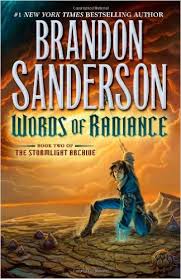
Right now I'm listening to Brandon Sanderson's… what the fuck is it called? Hold on. It's like you could just have made it in a fantasy book title generator. Hold on, it's called “Words of Radiance.”
It's just like this huge sprawling, endless thing. I think it's great. It's not super gross about women, which is good. Although, when I found it, I was Googling "best fantasy audio books" and I was looking at some Reddit board. Unfortunately, it's clearly like all dudes recommending books by dudes to other dudes.
Right.
There's this couple who narrate audio books and their names are Michael Kramer and Kate Reading and they're married. I became familiar with them because they narrate all of the Wheel of Time books which are hundreds and hundreds and hundreds of hours long. I'm almost all the way through them. That's where my fantasy body started.
So Kate Reading reads the female chapters, chapters that are for the female narrator, and Michael Kramer reads the chapters of the male narrator. They do the same thing for these Brandon Sanderson books and also, Brandon Sanderson was the author who was brought in to finish the Wheel of Time books after Robert Jordan died.
Anyway, so I'm looking at this message board and they're like, "these Stormlight Archive books are amazing," or the audio books. They're like, "Michael Kramer's so good! Kate Reading, I don't care for." They're like, "I don't know what it is about her. There's just something annoying that I hate."
”I think her chapters got cooties in my ears…..”
They weren't self-aware enough to realize that connection. Then a bunch of them were like, "Yeah, me too!" So, clearly it wasn't just like one guy didn't like her voice or whatever.
Then when I finished the first book in this series, then I was like, "oh, I wonder if there's an audio book of the second book." And there is. There's two main characters, a man and a woman. The first book is mostly about the man, who's a warrior-man having warrior emotions on a battlefield. Then there are also chapters about this woman but they're secondary and she's a scholar-magician-whatever. Then the second book is more about her. It was the same thing where all these dudes are like, "No, I don't know. I just really loved the first one. There's just something about this one that's kind of boring to me. I don't know. I just don't connect to it as much." It's just like man, you guys, just be around a girl for a minute. What is wrong with you?
Is that what you think it is, is that the experience is so alien to them or something?
I don't know. Also, I can't presume to know why they don't like Kate Reading and Shallan Davar. That's the character.
I remember as a kid being bored by the kissing parts in the movies, but it can't possibly be like that for an adult man, can it?
Did you see that thing? There was a story the other day where some video game was forcing dudes to play as women and they were like, "Baah." They could not deal with it. It isn't really a hostility like, "Oh, I fucking hate this book." It’s just like a boredom. It was like “I've been taught to find this boring.” I'm adding the “I've been taught” part, but there's nothing inherently boring about it. It's the same story. It's the same universe. It's the same writing style, same everything. The difference is that [the main character is] a woman. They're both doing the same, well I don't want to give any spoilers away, but ...
Okay. Hate to ruin somebody else's fantasy body.
I think a lot about why I'm drawn to this genre and I haven't figured it out yet. I'm resisting temptation to figure out a way to phrase this as a compliment to myself. I just feel the world very deeply and so sometimes I need a break. I don't know. There's something about maybe working in this job where you're just bombarded with information about the real world 24/7, and everything that's wrong with it, and everything that can't be fixed and I get so exhausted.
I always liked fantasy when I was a kid, but I read everything when I was a kid. Now I just, the idea of reading even just a really good book about real people's lives. I'm like, “oh yeah, okay, I do want to do that but, I'm so tired.”
You have this 24-hour feed of people's lives into your brain. I think I could easily break through that wall because obviously I still appreciate beautiful writing and I care about people's lives and I assume this phase will go away. For right now I have time for the Internet — processing it and writing about it. Then I have time for listening to stories about knights and people with names that sound like pharmaceutical medications. Everyone's name's like Geurdivan or whatever.
People who specialize in the riding of dragons.
There's no dragons in this series, so that's okay. There's, like, the crab things. So that's something.
I could listen to you talk about fantasy books for fucking days. I just love it.
Well, if you ever want me to give you a plot synopsis of the Stormlight Archives, I'm still figuring out what's going on. It's supposed to be a ten book series. Each book is... I haven't held a physical book but these audio books are like seventy hours long, so it must be at least a thousand page book.
Every time I try to pick up a sci-fi book now it's like the first book in a series. I just find that incredibly disheartening as a reader. That's part of the whole fantasy thing, so you must enjoy that.
It's not like I've always been a reader of contemporary ... I don't usually read fantasy novels as they come out, you know what I mean? The fact that this dude's only finished two books of his 10-book series is troubling. I only have eight hours left on my audio book and I'm like, then what? Then I have to wait twenty years for your next one, Brandon?
I'm the same with TV. I'm a binge watcher. I don't like to watch something every week they have to wait. I would rather pretend it doesn't exist and then at the end of the season watch the entire season.
It was really fun, sort of, to go through the entire Wheel of Time, sort of. So tedious. I never finished. I need to finish. An immersive, long-form book is so engrossing and you get so attached to it and you don't want it to end. Sometimes it doesn't end for four hundred hours, which is great.
Then the author dies and then another author comes in and finishes it for you.
Right. I'm a big fan of the original fourteen Wizard of Oz books, but then after L. Frank Baum died, there was like a million other authors who were like I also write books about Oz. I didn't read that shit. I don't do that. I'm not going to just read it for the sake of reading it, you know what I mean? I still want it to be good.
Which seems as good a segue as any to get back to your book. You do get more personal in Shrill. All your writing is personal in that it comes from your perspective, but you do write more about particular events in your life here. Given that your life has already been used by certain people against you, it seems like you've given them a little bit and they just take it and throw it at you.
You mean bad people?
Yes, bad people. I don't want to talk about the bad people for the most part because they just take up so much bandwidth anyway. But this had to be a consideration when you signed on to write something that's kind of memoir-y.
Honestly, it's not that big of a consideration anymore. I'm curious, kind of. I wonder what they could possibly take from this to hurt me with. I've been doing this for so long that I'm not afraid of them anymore. I'm just tired. I don't want to limit my career and what I do because of bad people.
Were there other concerns though, about writing about yourself like this? We were both kind of trained to offer ourselves to readers but not to go to overboard with it.
Yeah, when we wrote at The Stranger, writing was different then. It was especially unfashionable then to be sincere and vulnerable. Irony was still like, really big, which was great at the time. I don't know. It's weird. I was just thinking about this yesterday. I feel like people think of me as an over-sharer. Instead, I'm actually really, really private. There are a lot of things that I don't write about at all and I never would and I'd be really uncomfortable sharing. I feel like I let people into a very carefully curated part of my life that's very honest and is vulnerable.
I am curious to see if trolls bother to read my entire book. If they do, I hope they'll buy a copy. I guess they could download the e-book illegally or whatever.
There are pirates.
You think I'll get pirated?
I'm sure you will get pirated.
That'd be kind of flattering. My publisher probably would be mad that I said that. I don't know. What could they throw at me that they haven't already done?
[Knocks on wooden table.]
I know, right? I know. I probably shouldn't be interested in finding out the answer to that. Also, what's going on with the Gamergate crowd right now is crazy, where they just pick a thing and then decide what it means and then all signal boost each other until people just believe that that's true, you know what I mean?
Crowdsourced gaslighting of people?
Yeah. Like, that woman that got fired at Nintendo for nothing because they just made up a thing. We'll see. I've said this before: the more vulnerable you make yourself, the less vulnerable you are. If it's already in the book, what can you say if I already said it? You can't, like, gotcha me on anything that I put deliberately in my memoir.
I'm kind of retreating from the Internet, anyway, a little bit. I'm hoping to just move on to writing another book after this and I'm certainly not going back to daily blogging. It's so hard. It's just too taxing. There's also always the chance that a troll will read the book and change their mind.
I'm sure that does happen, because books are good at doing that to people. Putting them in someone else's head for two hundred pages can introduce a new kind of empathy to their lives.
That's kind of the whole idea, right? Yeah, so maybe that will happen. That'd be kind of interesting, not that I would ever know about it. And that was an express purpose of writing the book, was to humanize myself.
Just think about that phrase for a second. “To humanize yourself.”
I know. But, you know, to make people like me, to be funny and charming and make people like me. Then be like, "Haha, you like a feminist" or "you like a fat lady," or whatever. I did that on purpose. That's in the book proposal. This is what I want to do. I guess I look forward to people who don't like me reading the book. If they decide to torture me, ugh, I'll deal with it. It will be fine. I've dealt with it before.
There was a very specific moment when your star was on the rise when you were at The Stranger where it felt like if you had gotten started ten years before, you probably would've moved to New York City because that's what people did at that point. In the book you write about going to L.A. and trying that out for a little bit. I know you made a conscious choice to stay in Seattle and I was wondering if you could talk a little bit about your relationship to Seattle and what that choice was like?
I'm from here. I really love it here. I just love Seattle so much, and I always have. Both of my parents are from here. There's something about knowing that when I drive through downtown, I can see my dad walking down the street with his briefcase in 1973 or whatever. You know what I mean? It just feels like it's in my DNA. It's an easy place to live. It's quiet. It's beautiful. My family is here. I have a beautiful house. I mean, I don't own it. That'll never happen.
It's my home town. I was lucky enough to have a really great home town that I love living in. I just had the good fortune to keep getting jobs where they said I could work from wherever, so there's just no compelling reason to go. It's like well, all right. If you're going to pay me a New York salary to live in Columbia City, sweet. I will do that. I know that I'm missing out on things. It's hard to know what my career would be like if I had moved to New York. I definitely miss out on things like media cool kid happy hour, or whatever, you know what I mean.
That was a great face you made when you said “media cool kid happy hour” that I wish I could record.
I don't regret not being there for that. I think it's kind of interesting to be this weird outsider where I go to New York and people are like, "Oh, I've never met you." You know what I mean? Like, "Oh, you exist." Also now I'm married and I have stepdaughters and you can't just move children. Their mom lives here so we'd have to move her. I don't think that she wants to move to New York and I'm not a millionaire. Life gets complicated and you get rooted in a place.
Aham and I have both had opportunities to work on TV shows recently and potentially in the future. It might end up where we spend half the year in New York, or a couple months a year. We're not ever going to leave Seattle as far as I know.
That's not to say that Seattle doesn't have problems. It has problems that definitely affect us. My husband doesn't want to live in a neighborhood with all white people and our neighborhood is becoming mostly white people in a way that is alarming. I don't know what we're going to do about that. Just keep moving south, I guess.
Yeah. Tukwila, here we come.
It's really important to us that we live in a diverse area and that our kids live in a diverse area. That's going to be a constant negotiation, but we'll figure it out. Both of us are really attached to Seattle. possible to do things here on a scale that's really fun. If I wanted to do a one woman show or whatever I could call people up at a bunch of different theaters and be like, "Will you help me?" It might not work, but I would at least know who to call. In New York, who am I, you know what I mean? Where would I even start? Maybe I should do a one-woman show.
You should. You totally should. Was there anything that was especially surprising about the publication processes compared to the world of blogging and…columning that you came from? From whence you came?
There's a lot more support. You have a team of people working on your thing with you. Whereas, working for the internet is increasingly like, “okay, finish your thing and put it up. We’ve got to write eight hundred more blog posts today. No time to fact check. Don't worry about it. You're your own copy editor.” So [the process of working on a book] was nice. It feels very old school.
The thing that surprised me the most about this process was that I was able to do it. It's really scary: it feels very hubristic to me to be like, “oh yes, I can write an entire book.” I have never felt that way about myself. I never even planned on being a writer in the first place and I'm still kind of convincing myself that I know how to do it. To be like, “yes, I will now write an entire book about me.” I'm not that interesting. I'm really not. My life is really just normal and good. I wasn't raised in a cult. I didn't have any kind of cool backstory. I just had two nice parents and we lived in a nice house in a nice city and I went to a great school and I had great friends, you know?
You're really selling this book.
Yeah, don't put this part in. [To the recorder:] There is a cult.
Getting over all that was kind of scary and hard. Can I really do this? Then, once you sit down and start to do it and you're like, okay, I write a thousand words all the time; I just have to do that 85 times or whatever. However many times a book is. Mine ended up I think, being about seventy thousand. Then you start to do it and you start to trust yourself and realize, “I do know how to do it.” I've been doing this job a long time. I was surprised, kind of surprised that I got it done and that I actually made something that I'm really proud of and that people like. I hope. I hope people like it.
I like it!
Thank you.
I think it came together really well and I...
Yeah, but you're my friend.
Yeah, and that's why I can't review your book. But I think it works really well as a book, which was my concern going in — that you had such a short amount of time. Not that there's anything wrong with a book of essays, but I think it would be a little bit of a letdown for you to have written a book of essays first because people have read so many essays by you, right?
Yeah, totally.
This functions as a book and there is a narrative, even if it's not directly handed off from one chapter to another. I think it's a good book.
Thank you. I'm really shocked that I can't wait to start writing another book. I think this book turned out really well, but now I know how to write a book and now I'm really excited to see what my next book is. I think I can make it really good. I just want to win an award, Paul. It’s not so much to ask.
I guess it depends on which award.
Well, I'm not picky.
Our friends at Seattlish just broke the story of a class-action lawsuit filed against the owners of Emerald City Comicon for not paying their volunteers. (ECCC officially calls its volunteers "minions," which is not a very good look; ECCC vendors and talent have complained to us about how "demeaning" that title is on multiple occasions.) Seattlish explains:
According to the suit, the volunteers are expected to work essentially as paid workers would — performing functions necessary to the operation of the convention — but aren’t required to be paid for their labor or their overtime due to their volunteer status.
Seattlish notes that minions "willingly enter into an agreement stating that they’ll work for free," but, as ECCC is a for-profit business, this means the volunteer status could legally be interpreted as nebulous. It's a stretch, but these volunteer positions might be perceived as similar enough to unpaid internships to make things tricky for ECCC; in recent years the federal government has been (rightfully) cracking down on abuse of unpaid internships by for-profit businesses. This story is a very big deal, and Seattlish will be all over the suit as it progresses. We'll keep you posted.
Your Week in Readings: The best literary events from May 18 - May 24
Wednesday May 18: The Furnace
The Furnace reading series features a local writer reading a single story with audio effects from the good folks at Hollow Earth Radio. This month, Christine Texeria reads “Immanent Ghosthood,” the story of a father, a daughter, and Mortal Kombat. Chapbooks of the story will be available for sale at this live broadcast. Hollow Earth Radio, 2018 E. Union St., 617-1683, https://thefurnaceseattle.wordpress.com/. Free. All ages. 7 p.m.Thursday May 19: Where the House Was
Hugo House co-founder Frances McCue reads from a long poem about the House that will be incorporated into a documentary about the writing center’s closure, transition, and eventual reopening. She’ll be joined by Rebecca Brown, cellist Lori Goldston, and former House students Cali Kopczick and Jack Chelgren. Hugo House, 1634 11th Ave, 322-7030, http://hugohouse.org. Free. All ages. 7 p.m.Friday May 20: Writing on the Wall
Here it finally is: the final event at the Richard Hugo House in its current incarnation is an outing of their Literary Series, in which novelists Jenny Offill, Laura van den Berg, artist Dawn Cerny, and poet Maged Zaher all produce new work on the theme “Writing on the wall.” Hugo House, 1634 11th Ave, 322-7030, http://hugohouse.org. $25. All ages. 7 p.m.Saturday May 21: Seward Park Third Place Books Grand Opening
See our Event of the Week column. Seward Park Third Place Books, 5041 Wilson Ave S., http://thirdplacebooks.com. Free. All ages.Sunday May 22: Word Works
Memoirist Domingo Martinez offers a craft talk on the topic of “Fearlessness.” Fans of Martinez’s two books, The Boy Kings of Texas and My Heart Is a Drunken Compass, often ask him if he’s afraid to hurt people in his life by writing about them. Tonight, he provides a comprehensive answer. Elliott Bay Book Company, 1521 10th Ave, 624-6600, http://elliottbaybook.com . Free. All ages. 3 p.m.Monday May 23: Flip a Coin at Town Hall
Upstairs at Town Hall tonight, Siddhartha Mukkherjhee, who is best known for his biography of cancer The Emperor of All Maladies, reads from his latest: The Gene: An Intimate History. Downstairs, Nathaniel Philbrick reads from Valiant Ambition: George Washington, Benedict Arnold, and the Fate of the American Revolution. Can’t decide which to attend? Flip a coin. Town Hall Seattle, 1119 8th Ave., 652-4255, http://townhallseattle.org. $5. All ages. 7:30 p.m.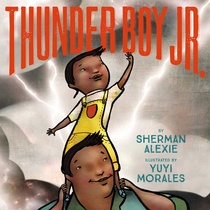
Tuesday May 24: Thunder Boy Jr Reading
Sherman Alexie is probably Seattle’s best-known author, and hands-down our most entertaining reader. Tonight, he debuts his very first picture book, Thunder Boy Jr, which is about the trouble with being a junior, of not even owning your own name. (Alexie’s full name is Sherman Alexie Jr., so he knows what he’s talking about. University Temple United Methodist Church, 1415 NE 43rd St., 634-3400, http://ubookstore.com. $17.99. All ages. 7 p.m.Event of the Week: Third Place Books Seward Park Grand Opening
Third Place Books managing partner Robert Sindelar possesses what might be the rarest talent in the United States today: He’s getting really good at opening new bookstores. Sindelar oversaw the creation and refinement of the gorgeous Ravenna branch of Third Place Books, which is an ideal neighborhood bookstore: not too big, not too small, and thriving at every hour of the day.
Sindelar’s at it again, this time in south Seattle: this Saturday, Third Place Books Seward Park is opening and, with its vaulted ceiling, copious natural light, and burnished-wood glow it’s a serious contender for the title of Seattle’s Most Beautiful Bookstore. TPB Seward Park will host Seattle-area authors signing books and offering recommendations throughout the weekend, including Maria Semple, Jonathan Evison, Tom Douglas, and Tim Egan.
In a tour of the new space, Sindelar demonstrates how much thought went into every little detail: you’re greeted with the new release tables, which are low enough to offer a commanding view of the whole store. If you walk the walls, you’ll pretty much follow the life cycle of a reader: first children’s picture books, then middle readers, then young adult books, then the adult fiction section, and then the used rare and collectible section.
In the back next to the used book buying counter is an elevated stage, where the store will host author readings. The bookshelves surrounding the stage are on wheels, to accommodate audiences of up to a hundred people. The store shares space with a restaurant called Raconteur, which is owned by Flying Squirrel Pizza Company founder Bill Coury; on the main floor it’s a cheery café, and in the basement is a bar and restaurant. Like the Ravenna store, TPB Seward Park is likely to be humming from early in the morning until late at night. The idea of a general-interest bookstore south of downtown seems beyond necessary; it’s kind of unbelievable that Elliott Bay Book Company was up until this week the southernmost general-interest independent bookstore in Seattle.
Third Place Books Seward Park manager Eric McDaniel tells me that TPB Seward Park will be staffed with eight full-time booksellers and two part-timers. Four of the staff are bookselling veterans with decades of experience between them and the rest are new to the business. McDaniel, a Seward Park resident, emphasizes that the store is located in one of the most interesting, diverse spots in town—some of the richest neighborhoods in Seattle and some of the poorest border the bookstore. He hopes to make the space welcoming to everyone using a variety of programs including book clubs (Seattle author Garth Stein, who lives in the neighborhood, will be hosting one) and community partnerships.
As Sindelar can attest, new bookstores really go through two phases of opening. First, there’s all the frantic shelving and planning that happens before the public is welcomed inside. Then, in the weeks and months after, the community shapes the store with its purchases and requests and the used books they bring to sell to the store. Everyone at TPB Seward Park is excited for that metamorphosis to begin.
Third Place Books Seward Park, 5041 Wilson Ave S, 366-3333, thirdplacebooks.com, 9 am, all ages, free.
Your Wonderland is a body
Published May 17, 2016, at 1:19pm
Spokane writer Sam Ligon writes short stories about pies, love, and goats. Why? Who knows?
Derrick noir
Published May 17, 2016, at 12:00pm
A futurist writes a science fiction novel in the near future. How much did she get right?
Selfies in the Wilderness
It wasn’t that she wanted to be pretty.
She wanted the world to see her
as she saw herself.She wanted to see herself.
That’s what my daughter tells me.
I watch her, high up on these rocks,
her arm extended in a welcoming gesture —
she invites the world in.I hold my phone arm up
an echo of her greetingand am horrified to see my face —
some jackass left the camera flipped
to stare back at the operatorand now I am confronted
with my judgmental chins
and slack mouth. Whatwas I thinking about to make
such a grim expression?I wanted to justify her figure
in this landscape. I wanted her
safe. My calcifying ideasclamp around her, like the tower
Rapunzel’s furious witch-mother
locked her in. This fortressI built with my own brain bowl,
bars grown from bone, I have stuck her
inside a snow dome, little white slipsflutter, so pretty; all the pages of magazines
telling girls how to be and the flicker
of grades and other ratings, ticker-tapeof male gaze and every comment
about her body — how tall, how blue, how boobs
and butt, how short the skirt —why all this feedback about her appearance?
Who asked you?
And why mock herwhen she draws her own door
and walks through it?
Mail Call for May 16, 2016
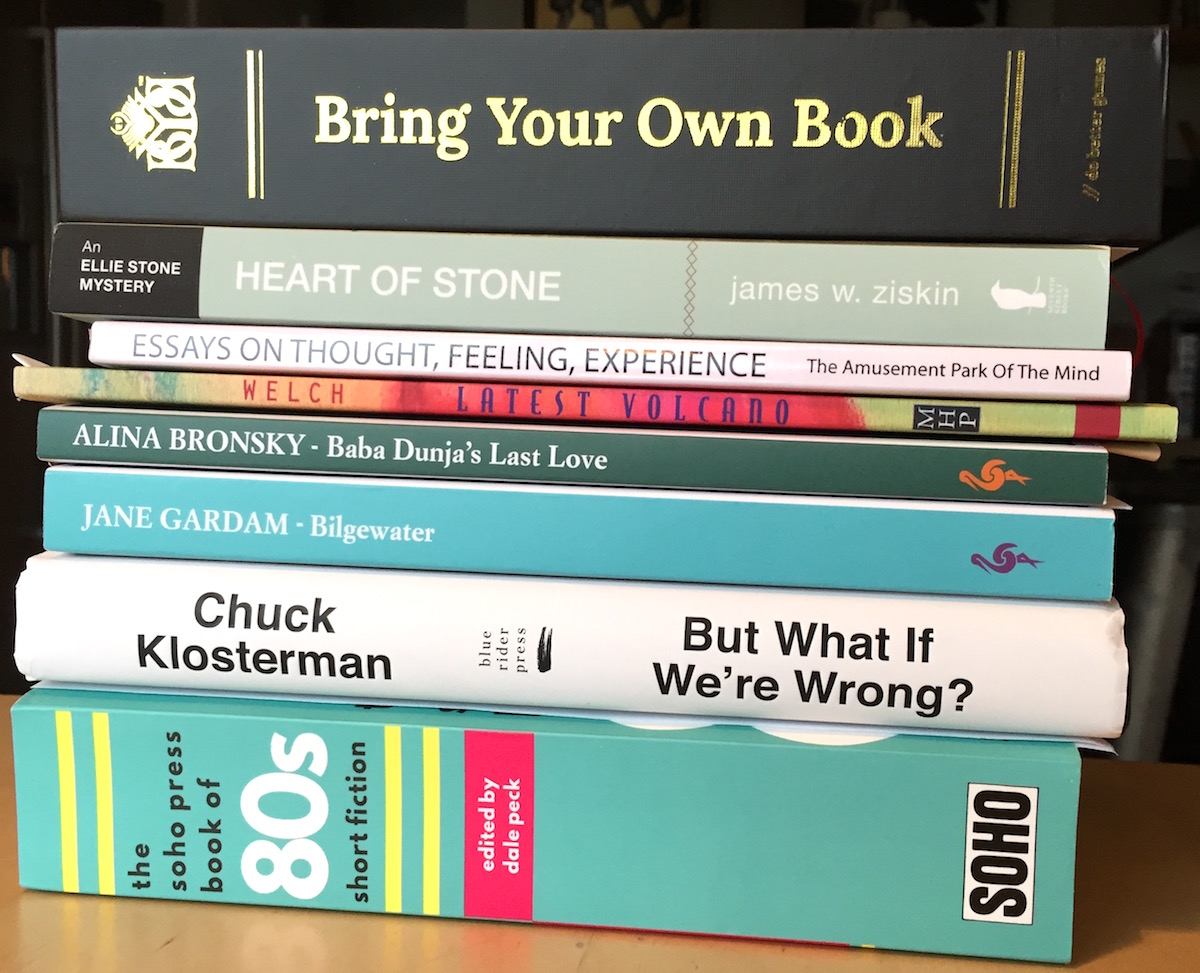
Wait a gosh-darn minute. That top one doesn't feel like a book. The weight is all wrong.
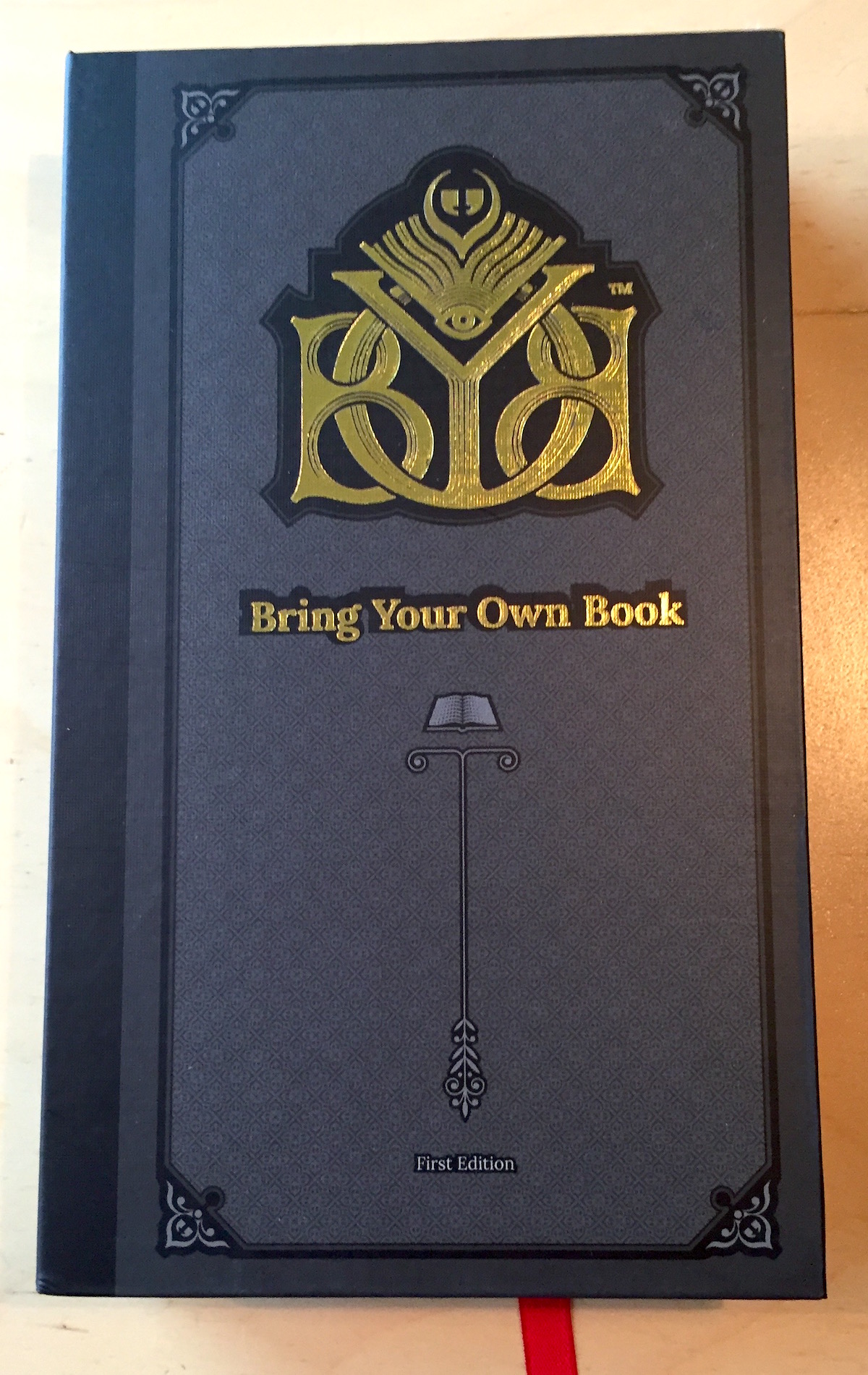
It kind of looks like it will open up.
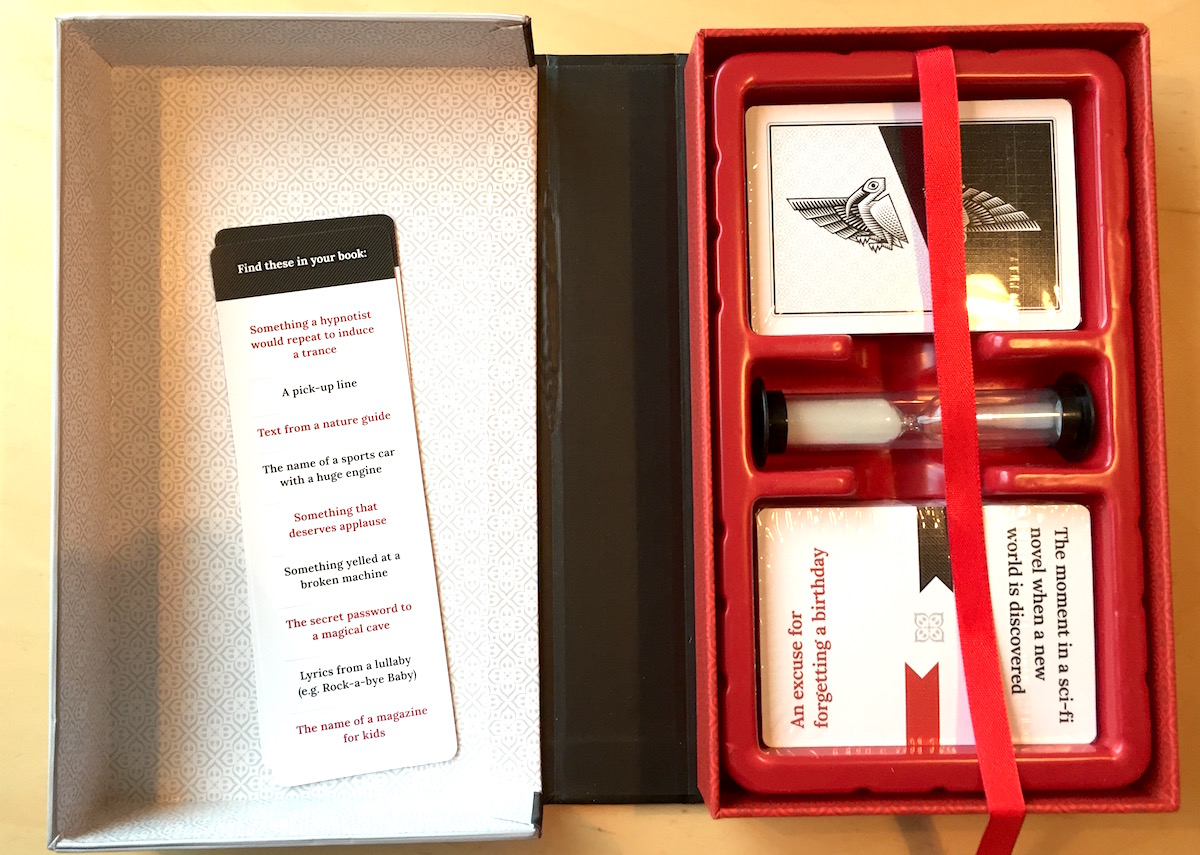
Wow! It's a game! How interesting.
South Korean author Han Kang has won the Man Booker International Prize for fiction with "The Vegetarian," an unsettling novel in which a woman's decision to stop eating meat has devastating consequences.
Kang is the first South Korean author to be nominated for the Man Booker. The book was translated from the Korean by Deborah Smith.
Talking about race in Seattle, through personal experience
Sponsor Lisa Richesson has an incredible story to tell in her book White Lady, Black Sons, one that explains Seattle's racist past through her direct experience. Lisa, a white woman, had two children with a black man. One, when she was a teenager, was put up for adoption.
The first chapter of the book, which you can read on our Sponsor's page, goes back even earlier to the first time she became aware of race, and just what happened in her cloistered white Catholic community when she became friends with a young black girl. It's a gripping story — read that chapter, and we think you'll agree, and want to know more.
We have only four sponsor slots left, before August. If you're a small publisher, writer, poet, or foundation that is looking to back our work, and advertise your own in an inexpensive and expressive way, take a look at our open dates. We'd love to talk to you about opportunities to sponsor us. It's our way of making internet advertising something to look forward to.
Go West, young woman
Published May 16, 2016, at 12:00pm
Lindy West's new book is here! We called in another feminist veteran of anonymous internet male rage, Brianna Wu, to give us her take.
Heroes of Weirdness: In Honor of Katherine Dunn
I came to Geek Love late in life — just a couple of years ago when I was 36, as I tackled edits on my own novel. I’d heard of Katherine Dunn for years, of course, but I was totally surprised by the weirdness in her work. Everything in Geek Love felt like a madwoman’s treasure hunt, complete with freaks, carnivals, flippers, Siamese twins, fetish strip clubs, and — yowzah — limb amputation. Here was a humpbacked narrator, powerful, vengeful, anything but a victim, and her diabolical family of misfits, humanized, metaphorical, as infinite in their weirdness as they were infinite in their reflection of us and our fragile relationship with normalcy. I loved the novel so much that I immediately went back and read it a second time, something I’ve only ever done with two other favorite books, Haunting of Hill House and Dubliners.
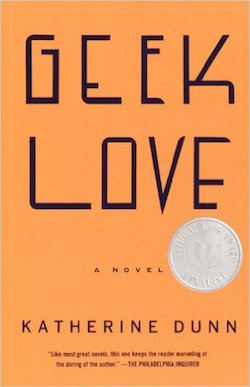
Dunn was more than just the brilliance of Geek Love, of course. She was a well-known sports reporter, covering boxing for the Willamette Weekly and other major news sources, and she wrote and published two novels before Geek Love, Attic and Truck, in 1970 and 1971, respectively. She worked in Portland as a waitress and, as her son wrote in her obituary, faced many challenges as a single mom.
Fortunately for us, she kept writing, and Geek Love became an unlikely best-seller. She never published the much-anticipated follow-up novel, but in 2009 Schnaffer Press did publish a compilation of her essays about boxing, One Ring Circus. Given the punchy, agile toughness of her fiction, it’s hardly a surprise that boxing fascinated Dunn. The sport is, in its rawest form, a manifestation of how we treat one another, how we relentlessly jab and skulk and pound and absorb and bleed and—despite our suffering—return for more.
The truth is, out of all of the celebrity deaths this year — and there have been many — I personally feel Dunn’s passing the most.
An excellent way to celebrate Dunn is to revisit her work, which no doubt many of us will do, but what might also ease her passing is to note the other women writing similarly strange and relevant fiction. Here’s a list of some of my favorite weirdo authors, who are, like Dunn, deft at drawing open the mundane curtain of everyday life and showing us the absurdism taking place behind it all:
Helen Oyeyemi This fairy-tale weaver’s latest, What is Yours Is Not Yours, begins with the quintessential set-up, “Once upon a time,” and then cleaves into unique short stories about “keys” and everything a key can symbolize, i.e. the opening of gateways, or the locking up of secrets. I also loved her last novel, Boy, Snow, Bird, a retelling of Snow White that is also a brilliant meditation on identity, race, and racism.
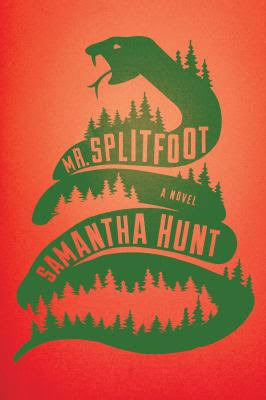
Diane Cook Cook’s short story collection, Man V Nature, is perhaps my favorite book about womanhood and environmental destruction. The stories are as strange as they are relevant to our contemporary life.
Julia Elliott Elliott penned my very favorite piece of last year’s Best American Short Stories, a grim gothic story called “Bride” about an abbey and a self-flagellating nun. Her lovely collection, The Wilds, published by Portland’s Tin House Books, contains a diverse supply of characters, eras, and strange situations that any Dunn-o-phile will appreciate.
Mercé Rodoreda Rodoreda (1908-1983) is as quintessential of an author in Spain as Dunn is here in the Northwest. One of her lesser-known novels, Death in Spring, is arguably the most impactful, difficult, and weirdest book I’ve ever read. It centers on a startling image: Villagers in an unnamed society securing the infirm and frail up to their necks inside of tree trunks and then pouring cement into their pried-open mouths. I picked this up this after Jesmyn Ward (author of the wonderful Salvage the Bones) mentioned it on NPR. It’s a novel I find myself musing over years later: It’s a total trip, disturbing and original. No wonder Gabriel García Márquez worshipped her.
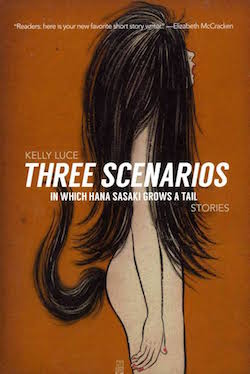
There are others, too, well-known and beloved, like Karen Russell and Kelly Link and Kate Bernheimer — Heroes of Weirdness, all — and I hope reading these oddballs of the literary world will help in celebrating Dunn’s broad influence.
Katherine Dunn is dead. Long live Katherine Dunn! Here’s to weirdness in the Northwest and elsewhere, and to reading literature that surprises us and transforms us as if by magic. Carry on, my dreamlets, and keep uncovering and extolling your own weirdness in the world, whether you wear it on the outside or not.
Every bookstore should include a bit of the great outdoors
As I said in my introductory Bookstore of the Month piece about Queen Anne Book Company, the store is relatively small when compared to some of Seattle’s other neighborhood bookstores, but its stock seems remarkably deep, as though it’s got the stock of a bookstore two to four times the size squeezed inside of it. It’s the kind of store that leaves you marveling at how much they do have, which is essential for a bookstore; those stores that leave you marveling at what they don’t carry do not tend to last that long.
This kind of breadth of inventory is a little bit like a sleight-of-hand trick: you draw people’s attention to what they want to see, by predicting their needs before they even walk in. It’s not the quantity of stock that’s important, but the quality; you don’t have to have every book ever published, so long as you have the books the customers want.
QABC bookseller Wendee Weiking confirms that their customers are often surprised by the store’s stock. She says that after “what a beautiful store,” the most common customer comment is some variation of surprise at the store’s stock, which Weiking paraphrases as “oh, my gosh, you do have this book! Wow, I kind of expected to have to order this, but I see you actually have it.” Owner Janis Segress deserves the lion’s share of the credit for this; she orders QABC’s stock. Weiking admires Segress’s ordering prowess: “that concept of matching a neighborhood’s tastes and peculiarities — I think there’s an art to that, right?”
But what about the books that customers don’t know that they want? Part of the genius of Queen Anne Book Company is its small back patio. On pleasant days, customers can take books out into the small open area behind the store, sit at some patio furniture, and read to their heart’s content. Of course, reading outside is the literary equivalent of an aphrodisiac; nothing will make you fall in love with a book faster than reading it in sunlight, with some wind on your cheek and a bird singing somewhere nearby. That back patio probably sells more books at Queen Anne Book Company than any blurb ever could.
This is a big one: Seattle author Elissa Washuta is receiving $25,000 in no-strings-attached funds for the Artist Trust 2016 Arts Innovator Award. (The other AIA winner this year is performer, writer, and musician Ahamefule J. Oluo, who will also probably write a book one day.) It's been a big year for Washuta, who also recently won the Fremont Bridge Writer-in-Residence title.
Along with the announcement of the award, Artist Trust announced that The Dale and Leslie Chihuly Foundation have committed to continue funding the Arts Innovator Award for another three years, through 2019. Get out there and innovate and maybe next year this post will be about you.
The Sunday Post for May 15, 2016
Democracies end when they are too democratic.
A long piece from Andrew Sullivan about democracy under populism, and how Trump works into all of it.
Many contend, of course, that American democracy is actually in retreat, close to being destroyed by the vastly more unequal economy of the last quarter-century and the ability of the very rich to purchase political influence. This is Bernie Sanders’s core critique. But the past few presidential elections have demonstrated that, in fact, money from the ultrarich has been mostly a dud. Barack Obama, whose 2008 campaign was propelled by small donors and empowered by the internet, blazed the trail of the modern-day insurrectionist, defeating the prohibitive favorite in the Democratic primary and later his Republican opponent (both pillars of their parties’ Establishments and backed by moneyed elites). In 2012, the fund-raising power behind Mitt Romney — avatar of the one percent — failed to dislodge Obama from office. And in this presidential cycle, the breakout candidates of both parties have soared without financial support from the elites. Sanders, who is sustaining his campaign all the way to California on the backs of small donors and large crowds, is, to put it bluntly, a walking refutation of his own argument. Trump, of course, is a largely self-funding billionaire — but like Willkie, he argues that his wealth uniquely enables him to resist the influence of the rich and their lobbyists. Those despairing over the influence of Big Money in American politics must also explain the swift, humiliating demise of Jeb Bush and the struggling Establishment campaign of Hillary Clinton. The evidence suggests that direct democracy, far from being throttled, is actually intensifying its grip on American politics.
Bots
Mandy Brown, on bots and gender, and reading from literature into life.
In fact, it’s not hard for me to imagine a straight line (or at least a moderately meandering one) between a generation of bot makers who anoint their creations with gendered names and personalities and the impossible reverie that is the singularity: could the very notion of the singularity be the embodiment of the oppressors fear that the oppressed will one day rise up and slay them? Perhaps the attention some men apparently spend on wondering whether AI will eventually surpass them should be instead spent on noticing the fact that women already have.
Are we sex-literate? Why we should all be writing more about pleasure
Joanna Walsh argues that sex-literacy comes from writing and reading about sex, and that is a feminst idea.
In the UK, according to the association for PSHE teachers, “‘Personal, Sexual Health and Economic’ education is a non-statutory subject on the school curriculum”. It’s a frequent but unresolved complaint that children are taught no more than the mechanics of sex, and are sent out into adulthood with little beside biological basics, except warnings of STDs and other consequences. “Thou shalt not [is] writ over the door” of the Garden of Love, just as it was when the poet William Blake questioned why our “joys and desires” should be bound by prohibitions and prescriptions. But what constitutes sex-literacy, and why does it matter?
When The Data Bubble Bursts, Companies Will Have To Actually Sell Things Again
Douglas Rushkoff on the far reaches of advertising and marketing.
The trouble is, if everyone is in it for the advertising dollar, who is left to advertise? At no point in history has advertising, marketing, and research ever accounted for as high a percentage of GDP, or total economic activity (and that's being extremely generous). But right now, it's pushing at the very top of that range. The reason it can't go higher is that only so much economic activity can go to promoting the rest of our economic activity. The coming crash in the tech market—and quite possibly beyond—will be triggered by the growing realization that every company in the world can’t be a marketing company.
Darwyn Cooke, 1962 - 2016
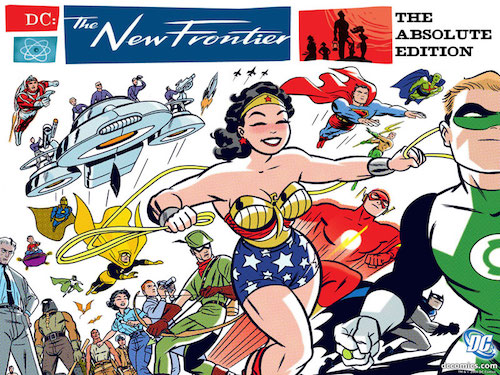
Yesterday, it was announced that animator and cartoonist Darwyn Cooke was suffering from aggressive cancer and receiving palliative care. This morning, his family shared the news that Cooke had died. He was so damn talented, and he died way too young.
Cooke's work has been hugely influential; many people who don't even know his name have seen and enjoyed his storytelling work. He started as a storyboard artist on the phenomenal Batman animated series, and then he went on to work on the Batman Beyond cartoon, including the iconic title sequence for the show.
From there, he made the leap to comics, working on Spider-Man and Catwoman. His best superhero work was The New Frontier, a magnificent comic that recast the DC comics universe in the optimistic early 1960s. In a just world, The New Frontier would have been just as influential as many of the darker, grittier, supposedly more "realistic" superhero comics of the last thirty years, but the truth is that it's easier to imitate something depressing and dark. It takes real talent to make something beautiful and hopeful and inspiring, and Cooke had talent to spare.
My favorite works of Cooke's were his stellar adaptations of Richard Stark's Parker novels. It's telling that Donald Westlake, the author who wrote as Stark, gave Cooke permission to not only adapt his novels, but use the Parker name in the adaptations; many of the film adaptation of the Parker books had to rename the protagonist because Westlake did not feel that they got the spirit of the story right. Westlake was right to give his permission; Cooke understood those novels inside and out. They rank as some of the most deft novel-to-comics adaptations in history, and they're impossibly gorgeous to look at. Cooke's decision to tell the story in black and white with spot colors made the books timeless and unique.
Cooke seemed as though he had thirty or forty more great works in him. His art was deceptively simple, because he trimmed away anything that didn't matter. His writing was a perfect pair with his art: economical, vivacious, and fun. Everything he touched came to life.
The Chemical Wedding by John Crowley - Kickstarter Fund Project #19
Every week, the Seattle Review of Books backs a Kickstarter, and writes up why we picked that particular project. Read more about the project here. Suggest a project by writing to kickstarter at this domain, or by using our contact form.
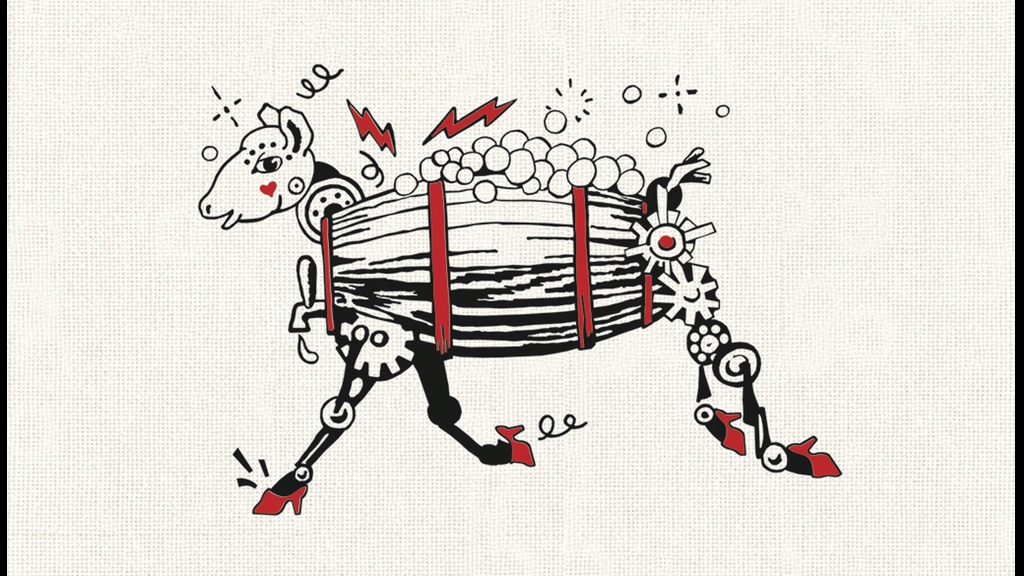
What's the project this week?
The Chemical Wedding by John Crowley. We've put $20 in as a non-reward backer
Who is the Creator?
Gavin J. Grant — Small Beer Press.
What do they have to say about the project?
John Crowley provides the chance for a contemporary audience to enjoy the "1st science fiction novel." We want to make it beautiful.
What caught your eye?
Small Beer Press is all kinds of wonderful. The work they bring into this world is completely unique, fantastical, and the quality is always high. It's one of those presses you can trust — you may not love everything they put out, but you'll never wonder why they published a certain author. And with names like press co-founder Kelly Link, Karen Joy Fowler, Ursula K. Le Guin, and Sofia Samatar, chances are really good you actually will love it.
This project is a work by John Crowley — and yes, as a press, Small Beer is going to publish a trade edition of it. But this Kickstarter is to fund a special edition. So this is an illustrated special hardbound edition, available in a few different flavors.
Why should I back it?
First, for the book itself. It looks great, and sounds interesting, as do the illustrations. Second, because we love to support presses like Small Beer who forge such interesting ground. Third, because we love special edition books, and this one looks like it will be lovely.
How's the project doing?
They're 27% funded currently, with just under $14k pledged of their $50k goal.
Do they have a video?
Kickstarter Fund Stats
- Projects backed: 19
- Funds pledged: $380
- Funds collected: $300
- Unsuccessful pledges: 0
- Fund balance: $660
Book News Roundup: A conversation about disability and the arts is happening this afternoon
Sorry for the late notice, but today at 4:30 pm, Seattle author Nicola Griffith will join Riva Lehrer to discus disabilities in arts and culture. Griffith is a SRoB favorite, and disabilities and the arts are not discussed very often in this town. So if you're free this afternoon, you should head up to the Odegaard Undergraduate Library for this event.
This morning, the editors of The Toast announced that the site will be ending on July 1st.
NICOLE: You have a WHOLE OTHER JOB and a book in progress, I think you’ll stay busy. Oh, let me state for the record that we do not do NOT want anyone to start a Save The Toast campaign of any kind, even though it would be so obviously lovely and kind of you! We are done.
MALLORY: No Kickstarters, please. If you start one I promise I will waste every single penny sent my way on expensive single-serving cakes and various perfumed unguents designed to enhance my beauty.
The shortlist for the Caine Prize for African Writing has been released. If you'd like to learn more about African literature, you can't really go wrong with this list.
Cartoonist Chester Brown's latest book, Mary Wept Over the Feet of Jesus, confused the hell out of SRoB co-founder Martin Mcclellan and I. But maybe we're not the only ones who were confused: comics blog The Beat discovered that Brown seems to have admitted accidentally misinterpreting a Bible passage in such a way that it furthered his own thesis. Of course, this doesn't invalidate Brown's book, but it does add another complicated layer to a book that is already made up of complicated layers.
I mean, these digital pop-up books look fun and everything, but aren't real pop-up books a lot cooler than these? Just saying.
If you ever wanted to read The Communist Manifesto but thought it had way too many words, the good folks at Crooked Timber have found a PDF of a 1948 Illustrated Communist Manifesto. Some of the drawings in this thing are truly incredible.
